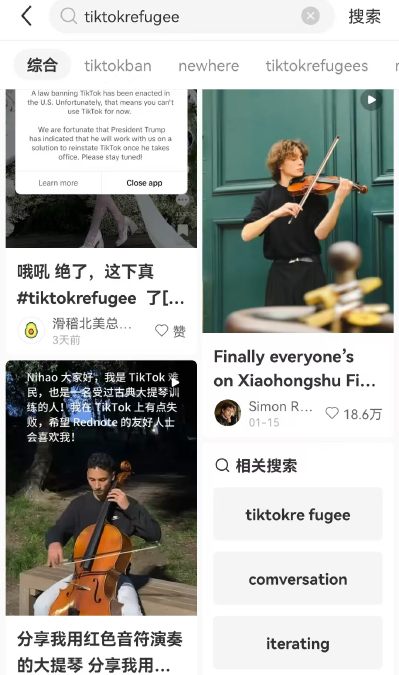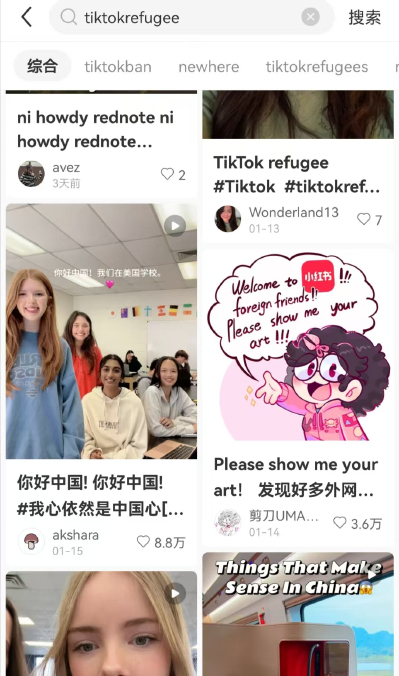| China |
| From TikTok to RedNote: navigating a shift in social media landscapes | |
|
|
 Screenshot of Xiaohongshu (RedNote)
Xiaohongshu (Little Red Book or RedNote), a very popular Chinese lifestyle and e-commerce platform, recently saw a meteoric rise in popularity—almost overnight. When TikTok faced a looming ban in the United States on January 19, a large number of the app's U.S. users flocked to RedNote to open accounts there and engage with both local Chinese users and their fellow U.S. users. Many of them, referring to themselves as "TikTok refugees," posted videos explaining their presence on the platform and interacted with the predominantly Chinese-speaking user base. In the days that followed, despite TikTok's fate oscillating between being banned and having the ban lifted, RedNote users engaged in extensive discussions on a variety of topics, which opened up unexpected avenues for cultural exchange between Chinese and American users. Digital migration On January 17, amid the influx of "TikTok refugees," 35-year-old Nicholas from the U.S. joined RedNote. Abiding by the community's playful, unwritten "cat tax" rule, he posted a photo of his cat. This rule, which originated from Chinese users' curiosity about newcomers' pets, evolved into a fun, informal initiation for overseas users on RedNote, encouraging them to share photos of their pets, and particularly of cats. Although Nicholas did not post many photos or videos and had just over 100 followers after four days, he was busy responding to comments. He addressed different questions from Chinese users about American lifestyles, such as income levels and the affordability of housing in the U.S. The instant translation feature on RedNote allows for smooth communication among people from different linguistic backgrounds. The conversation topics between Chinese and foreign users on RedNote quickly diversified, covering everything from pets to recipes, and even economic comparisons like the costs of vegetables, healthcare and salaries. A Chinese recipe for egg custard gained immense popularity, with a tutorial video amassing over 1 million views. This prompted numerous international users to share their own egg custard-making videos. Music also became a popular subject on RedNote, with several musicians sharing their tracks and gaining substantial followings among Chinese users. One user named "when" from the U.S. expressed his appreciation, saying, "TikTok can get unbanned, but I'm not going anywhere because you guys are hyping up my music so much, and I can't get over some of the responses you have given me." He then read some of the responses he'd received, including "your singing makes me resonate with nature," and every piece of your music "heals the heart from the very first note." He compared the responses to "poems." The platform also fostered deeper connections when Branden, a 37-year-old American, shared his experiences with grief following the death of a friend. This prompted users from both China and the U.S. to exchange views on death and share personal stories of loss. Branden felt supported by the numerous messages from his Chinese friends. "I feel honored to have so many Chinese friends share their perspectives on the meaning of death. Waking up to so many messages made me feel very supported and valued," he wrote in one of his posts. Live audio chatrooms on RedNote have become venues for discussing social differences and dispelling misconceptions, with one popular room attracting over 200,000 users simultaneously. The sudden popularity of RedNote among Americans has increased interest in learning standard Chinese. According to Duolingo, a website where people can learn languages for free, the number of U.S.-based learners studying Chinese has already soared by 216 percent from the same period in 2024, indicating a strong desire for deeper cross-cultural engagement. RedNote had skyrocketed to the top of the Apple and Google App Stores as of January 13. This trend also impacted China's A-share market. On January 14, just before the influx of American users, RedNote-related stocks like Foshan Yowant Technology and Inly Media Co. Ltd. hit their daily limit during pre-market bidding, accentuating the economic ripple effects of the app's popularity.   Screenshot of Xiaohongshu (RedNote)
Uncertain future In recent months, TikTok's fate has experienced dramatic fluctuations. On December 6, 2024, a U.S. federal appeals court demanded ByteDance, TikTok's Chinese parent company based in Beijing, to "divest the app in the U.S. by January 19, 2025, or face a ban." On January 19, TikTok's service was suspended in the U.S., and the app was removed from Apple's App and Google Play stores. In response to the shutdown, many TikTok users then migrated to other social media platforms to express their sadness and frustration. Alejandro Flores-Munoz, a catering business owner from Denver, Colorado, shared with the Associated Press how TikTok was instrumental in connecting him with customers at no additional marketing cost. "It's very disheartening, specifically because I truly relied on the app for my business growth," he remarked. However, just a day after the suspension, the service was reinstated as the new U.S. President, Donald Trump, who took the oath of office on January 20, signed an executive order hours after being sworn in, granting TikTok a 75-day extension to comply with the divestiture or ban requirement. As of now, the future of TikTok remains uncertain. Filip Filipovic, a Ph.D. candidate at the School of International Relations and Public Affairs at Shanghai-based Fudan University, discussed the potential impact of the situation with news portal China Focus. "It's hard to tell whether the influx of 'TikTok refugees' to RedNote will be a fleeting trend or a long-term phenomenon," he said. "However, this can certainly be seen as a watershed moment. It signifies the diminishing influence of Western social media platforms and their dominance in shaping public opinion, paving the way for a more diverse international discourse." Filipovic underlined the importance of the "TikTok refugees" moving to RedNote, pointing out that young people, regardless of nationality, can still engage effectively and enjoy communication on a benign, non-political platform, even without a common language. "Therefore, even if the positive interactions between American and Chinese Internet users turn out to be temporary, all of us involved in this space should strive to preserve this unexpected but wonderful environment. Let us join hands and work together to build a more harmonious, inclusive, and diverse Internet world," he concluded. (Print Edition Title: How a Ban Became a Bang) Copyedited by Elsbeth van Paridon Comments to yuanyuan@cicgamericas.com |
|
||||||||||||||||||||||||||||||
|